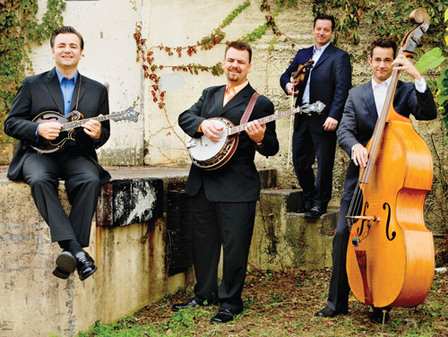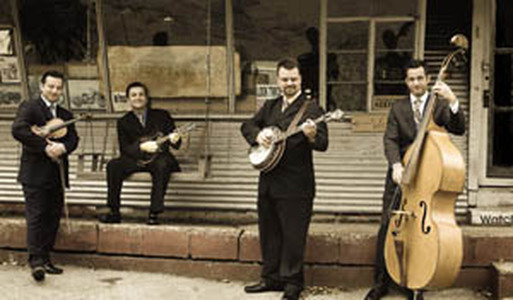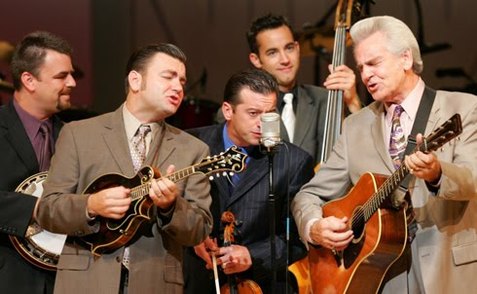Textbook bluegrass
Published in Berkshire Eagle, 3/2/11*

By Jeremy D. Goodwin
PITTSFIELD—Different strains of popular music seem inherently suited to express certain emotional palettes. The hip-shaking beats of rock and roll and rhythm and blues lend themselves to cries of love and its saltier offshoots. The cyclical, meditative form of Delta blues, with its twelve bars and turnaround, can be a straightjacket for the less artful, but for the masters it offers a deeply dug tunnel toward sublime expression of personal anguish. The tropes, are common, sure—unfaithful lovers, stubborn poverty, lingering depression—but great blues comes when an artist puts that formula in the service of an expression that is unmistakably personal.
Instrumental jazz may be the most personal of American musical forms, with its players sublimating emotional drive into the cry of a horn or the maniacally precise rap of a high-hat. Ken Burns can argue that jazz is a metaphor for democracy, but I hear (in the frenzied rush of bebop, particularly) a sort of existential desperation, each player jousting to get his own statement in while he still can.
Bluegrass, that other great American music, is preoccupied with personal misfortune as well. Is it a coincidence that blues and bluegrass, two forms of folk music born from rural poverty and political impotence, are each preoccupied with, well, feeling bad? The defining description of bluegrass is that it possesses a “high, lonesome sound,” in the coinage of its most important early practitioner, Bill Monroe. The music graduated from back porches and barn dances to a stylized formalism, with bands expected to wear shirts and ties, tight haircuts, and sing in a certain sort of high-lonesome harmony about their hard times. Technical dexterity and group interplay are particularly prized, and, as with blues, the great performances come when an artist uses these tools to sound like he’s the first person who’s ever picked up a stringed instrument and sung about being done wrong. The language may become stale, but when you hear Monroe sing about feeling “blue and lonesome,” you believe it’s true.
PITTSFIELD—Different strains of popular music seem inherently suited to express certain emotional palettes. The hip-shaking beats of rock and roll and rhythm and blues lend themselves to cries of love and its saltier offshoots. The cyclical, meditative form of Delta blues, with its twelve bars and turnaround, can be a straightjacket for the less artful, but for the masters it offers a deeply dug tunnel toward sublime expression of personal anguish. The tropes, are common, sure—unfaithful lovers, stubborn poverty, lingering depression—but great blues comes when an artist puts that formula in the service of an expression that is unmistakably personal.
Instrumental jazz may be the most personal of American musical forms, with its players sublimating emotional drive into the cry of a horn or the maniacally precise rap of a high-hat. Ken Burns can argue that jazz is a metaphor for democracy, but I hear (in the frenzied rush of bebop, particularly) a sort of existential desperation, each player jousting to get his own statement in while he still can.
Bluegrass, that other great American music, is preoccupied with personal misfortune as well. Is it a coincidence that blues and bluegrass, two forms of folk music born from rural poverty and political impotence, are each preoccupied with, well, feeling bad? The defining description of bluegrass is that it possesses a “high, lonesome sound,” in the coinage of its most important early practitioner, Bill Monroe. The music graduated from back porches and barn dances to a stylized formalism, with bands expected to wear shirts and ties, tight haircuts, and sing in a certain sort of high-lonesome harmony about their hard times. Technical dexterity and group interplay are particularly prized, and, as with blues, the great performances come when an artist uses these tools to sound like he’s the first person who’s ever picked up a stringed instrument and sung about being done wrong. The language may become stale, but when you hear Monroe sing about feeling “blue and lonesome,” you believe it’s true.

Which brings us to The Travelin’ McCourys,
a quintet born of bluegrass royalty who played a sizzling show at the Colonial
Theatre over the weekend. The sharply dressed, amiable group put on a display
of top-notch traditional bluegrass, hewing expertly to the genre’s conventions
but never seeking to subvert them. Making room for each other around a couple
of shared microphones, they played a mix of originals, covers and the
occasional well-honed traditional tune, alternating lead vocal duties and
joining together for gorgeous three-part harmonies on the choruses. This
is A-list bluegrass stuff—bandleader Ronnie McCoury and banjo picker Rob
McCoury cut their teeth playing with their father and bluegrass great Del, and
this band is the heart of the great Del McCoury Band without its namesake.
A band bio says the group can showcase “progressive” tendencies, but we heard none of that at the Colonial. Unlike newgrass pioneers Sam Bush and Bela Fleck, and the jamband-informed Yonder Mountain String Band—all of whom have played the Berkshires in the past three years—this unit basically plays it straight. And let there be no mistake: it’s a thrill to hear a great bluegrass band playing it straight.
A band bio says the group can showcase “progressive” tendencies, but we heard none of that at the Colonial. Unlike newgrass pioneers Sam Bush and Bela Fleck, and the jamband-informed Yonder Mountain String Band—all of whom have played the Berkshires in the past three years—this unit basically plays it straight. And let there be no mistake: it’s a thrill to hear a great bluegrass band playing it straight.

The combo acknowledged the
expectations of the form on more than one occasion. Mandolinist Ronnie quipped
that one song early in the set was not just sad but “downright pitiful,” and
averred that to play a song like that “you need a good, sad fiddler.” The
fiddler in question, Jason Carter, described the jokey “What a Waste of Good
Corn Liquor” as possessing the “perfect ingredients for a bluegrass song,” as
it is “a little about love, a whole lot about drink, and a little bit about
death.” It’s as if the band was glad to play a fixed role, but couldn’t help
pointing at the scenery. Jamie Hartford’s ominous “Somebody’s Gonna Pay”—a tune
about dislocated violence and a man’s inability to process his rage—was
expertly rendered, but the onstage smiles and mild-mannered harmonies failed to
convey the portentous darkness of the words.
Ronnie’s “Baltimore Johnny” contained a thrilling, extended instrumental workout, including a breakdown featuring the author and Carter. Elsewhere, guitarist Cody Kilby (on loan from Ricky Skaggs’ band) was showcased on his composition “Impressions of Norway” and “The Squirrel Hunters,” the latter a ripping instrumental that received one of the night’s many ovations. Bassist Alan Bartram was particularly solid all night, and shone when he took on lead vocal duties for the beloved chestnut “Kentucky Waltz,” a song originally made popular by Monroe.
Traditional bluegrass demands precision, and there is something awe-inspiring about hearing a great bluegrass band hitting on all cylinders—as The Travelin’ McCourys did this evening. I would have happily heard two more sets to match the two they played. But there was a certain airtight feeling. Though they spent the night frequently skimming the surface of heartbreak and woe, they did not delve too deeply—never leading the listener to wonder if the emotions in the songs were deeply felt or simply artifice. This night, the form was the star.
Ronnie’s “Baltimore Johnny” contained a thrilling, extended instrumental workout, including a breakdown featuring the author and Carter. Elsewhere, guitarist Cody Kilby (on loan from Ricky Skaggs’ band) was showcased on his composition “Impressions of Norway” and “The Squirrel Hunters,” the latter a ripping instrumental that received one of the night’s many ovations. Bassist Alan Bartram was particularly solid all night, and shone when he took on lead vocal duties for the beloved chestnut “Kentucky Waltz,” a song originally made popular by Monroe.
Traditional bluegrass demands precision, and there is something awe-inspiring about hearing a great bluegrass band hitting on all cylinders—as The Travelin’ McCourys did this evening. I would have happily heard two more sets to match the two they played. But there was a certain airtight feeling. Though they spent the night frequently skimming the surface of heartbreak and woe, they did not delve too deeply—never leading the listener to wonder if the emotions in the songs were deeply felt or simply artifice. This night, the form was the star.
